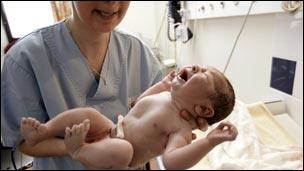Midwife-led births 'should be the norm not exception'
- Published

Maternity care 'should be led by midwives'
Maternity units should offer midwife-led care as the norm rather than the exception, says a health think tank.
The King's Fund report notes that last year only 10% of hospital births in England were in midwife-led wards.
But it warns financial pressures mean it is unrealistic to expect significant increases in midwife numbers.
The Royal College of Midwives (RCM) said an extra 4,000 midwives were needed before a change in care patterns could be implemented.
The researchers looked at studies from the UK and other countries to find out how maternity services could be made safer - without any increase in resources.
They recommend midwife-led care be used much more widely for women who are not at a high risk of having problematic births.
One UK study suggested that £2.5m could be saved by getting midwives, rather than junior doctors, to examine healthy newborn babies.
And the report says midwives' time could be used more effectively if maternity support workers and specialist nurses helped with some of their tasks.
The King's Fund's director of policy, Anna Dixon, said: "Expanding midwife-led care would free up doctors to spend more time caring for higher-risk women.
"Having sufficient staffing levels is important, but there is a need to rethink how staff are deployed."
'Folly'
The Royal College of Midwives believes up to 4,000 extra midwives are needed to keep pace with the UK's rising birth rate and the increased complexity of many births.
Its general secretary, Cathy Warwick, said: "Maternity care, like the rest of the NHS, is facing a storm of possible cuts to services.
"I am here to warn of the folly of such a course. It is difficult, if not impossible, to reorganise your workforce if you do not have enough of them in the first place."
The NHS is under pressure to save up to £20bn over the next four years by finding more efficient ways of working.
The parenting charity NCT (National Childbirth Trust) said it was delighted about the recommendation for more midwife-led care.
Its chief executive, Belinda Phipps, described the report as "food for thought".
She said: "We welcome the focus on skills mix but we would warn against any changes driven by lack - either of money or midwives."
A Department of Health spokesperson said: "We are committed to improving maternity care. There are currently a record number of midwives working in the NHS in England, with almost 300 more since May last year.
"The Government is committed to giving people more control over their own care. We want mothers-to-be to be able to have a normal birth wherever possible.
"There should be real choice over where to give birth, supported by accessible midwife-led care.
"We will continue to work with the RCM to make sure we have an appropriately resourced and skilled workforce based on the most up-to-date evidence."
- Published29 December 2010
- Published16 November 2010